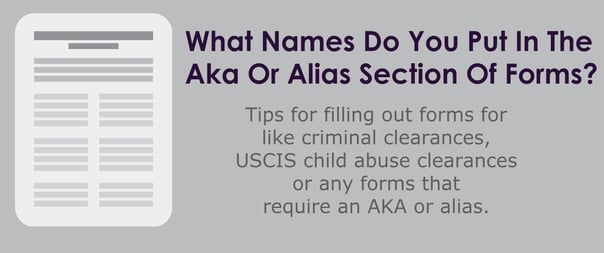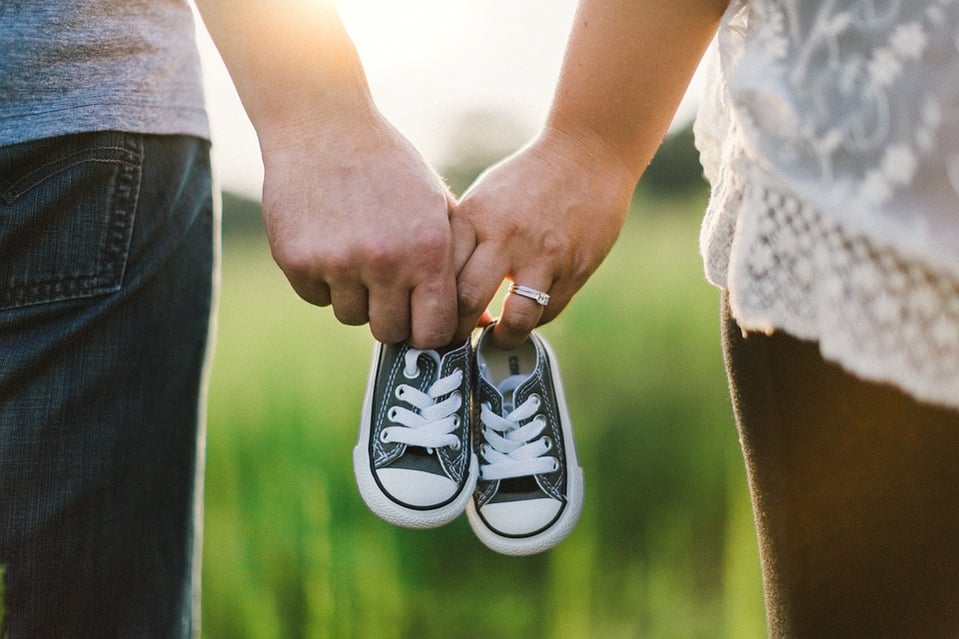Tips for filling out forms for such things as criminal clearances, USCIS child abuse clearances or any forms that require an AKA or alias.
During the adoption process, as well as other processes like being cleared to work at an elementary school or at a government agency, you will need to fill out forms that ask for any alias which you might ever have been known by. What does this mean? How far back do you have to go? Do you have to include all of your nicknames that you’ve ever gone by?

The government departments and agencies that conduct the background checks and clearances need to know all names you have ever gone by in order to be compliant with the law when issuing you a criminal or child abuse clearance. The names you must include are the following:
- Name you currently use. This should be the name on a government ID like a passport, driver’s license or military ID.
- Your maiden name, if applicable, even if it is your current name.
- Nicknames which you publicly use on other forms, usually a derivative of your name, such as if your name is Daniel and have been known as Dan or Danny.
- Nicknames which you have publicly used in the past.
- Pen names/stage names/professional names you do use or have used in the past.
If your mother calls you “Cutie Pie” or a nickname that is more personal you DO NOT have to list that name on the form.
Even if a name was not a legal name, you still must include it on the form. For example, if your full name is Jane Roberta Smith but people have always called you Roberta, your friends call you Bobbi, you use J. Roberta Smith on legal documents, and your birth name was Jane Roberta Jones, then you must include the following names in the AKA (also known as) or alias section of the form if you have used them:
- Jane Roberta Jones
- Roberta Jones
- Bobbi Jones
- Roberta Jones
- Jane Jones
- Jane Roberta Smith
- Roberta Smith
- Bobbi Smith
- Roberta Smith
- Jane Smith
Sometimes, it seems redundant and irrelevant to include things like the nickname your friends call you, but it is nevertheless an alias. Criminals have been known to use nicknames or different iterations of their legal name on their record or on legal documents, and therefore the entities that perform background checks and child abuse clearances must know every name you have gone by in order to be thorough and make sure the children in your care are safe. Most importantly, if you don’t put your alias or AKA it may delay your adoption process.
These background checks and clearances are so important for adoptions because a child is being placed into a home permanently. Families who adopt must be thoroughly investigated so that the chances of a child being placed with abusive or criminal parents is minimized. If you have been arrested or convicted of a crime, you must disclose that to your agency when filling out your adoption paperwork. People who have committed some crimes will still be cleared as adoptive parents, but if the crime was serious or related to violence or abuse they will most likely not be approved to adopt. For instance, if you were arrested as a teenager as a result of making a “dumb” choice, you still have a very good chance of being approved. You will need to do a little extra work such as write a letter explaining the situation, how it changed your life and what lesson the incident taught you. You will have to talk to your adoption social worker or case manager about how to best handle your specific situation.
Be sure to disclose every arrest even if it did not result in a conviction as well as any conviction that was sealed, ameliorated or pardoned in an adoption clearance. You may have been told that you do not have to disclose an arrest or conviction to an employer. That may be true, but all arrests and convictions will show up in the adoption process. If you have had a child abuse charge that was “unfounded” this will not show up on a New York State clearance, but you should still disclose the incident. It is very important that you tell your adoption social worker any incident that is a “yes” to their questions regarding criminal or child abuse history, even if you think it might not show up on your record. Failure to disclose may have a more serious consequence that the incident itself.
If you have any questions about forms you must fill out with an alias or AKA section, make sure to ask your adoption social worker (or whoever you are filling the forms out for).




Let Us Know What You Thought about this Post.
Put your Comment Below.